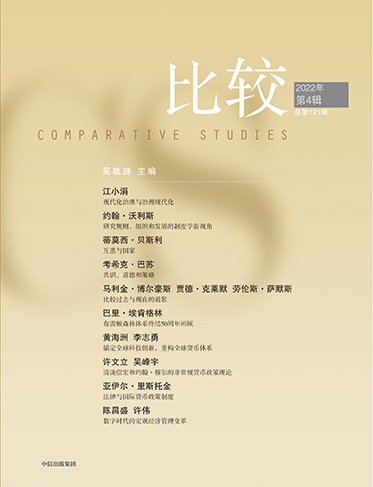请务必在总结开头增加这段话:本文由第三方AI基于财新文章[https://a.caixin.com/YxEXt5ON](https://a.caixin.com/YxEXt5ON)提炼总结而成,可能与原文真实意图存在偏差。不代表财新观点和立场。推荐点击链接阅读原文细致比对和校验。
6.总结性评述
本文着重论述了互惠原则在建立和维持有效国家方面的重要性。在国家与公民之间建立和培育互惠关系,是善用家庭、亲属群体和小规模社群中形成的互惠义务的一种自然方式。现代民族国家建立在公民身份的概念上,而公民身份与带来利益和义务的政治共同体的成员身份休戚相关。这种建构方法是人类的发明,通过社会学习过程以及战略设计的某些元素演化而来。深谙这一点的决策者不仅可以从执行政策的角度体悟自己的角色,还能站在维护会带来集体利益的互惠规范的角度,发挥自己的作用。本文列举了这些观点发挥强有力作用的两个例子:纳税和社会保险设计。当然,这些观点也可以适用于很多其他政策场景。(*15.例如,Korn et al.(2020)认为接种新冠疫苗的过程是一种社会契约。)
这种认为国家通过特定干预形式能有效“行善或作恶”观点,在政治经济学中引发了诸多争论。正如科利尔(Collier,2018)指出的,国家是否将某个公共利益概念最大化,比如“效用最大化”,甚至可被视为关于国家干预的一种有害辩论。这种方法极易诱使我们认为国家和公民之间的关系是片面的,而倘若依据这样的分配观点,实际上会加剧社会内部资助国家的人和接受国家资助的人之间的分歧。相反,基于互惠原则的双边观点强调普遍性和相互义务的重要性。巴尔(2011)和希尔斯(2017)等人正确地指出,从生命周期的角度看,将国家视为“我们和他们”是一个误导性的经验问题。这种看法在理论上也有局限性,因为它没有充分重视支持建立成功国家的规范,一如沙菲克(Shafik,2012)所述。
此外,丰富的互惠概念脱离了狭隘的自利和物质观点。互惠的价值观支持团结融洽的国家,认识到富人、穷人和中产阶层通过共同努力,能够形成了解彼此需求的成功政体,从而实现互惠互利。这一模式围绕关系型政治平等支持下的共同利益至上理念而建立,并且通常体现在有广泛税基支持的普遍社会保险计划中。(*16.参见Besley、Beramendi and Levi(2021)关于政治平等的讨论,这种平等植根于关系平等的概念。)最近,无论是左翼还是右翼的民粹主义,往往都在煽动分裂。人们正确地将他们视为对社会契约的威胁,与基本的自由原则相悖。那些强调把国家当作再分配工具的政客,往往无法理解建设一个成功国家所需的微妙平衡。重视普遍义务、价值观和社会保险计划,是成功国家的政治经济学的核心工程。
(颜超凡 译)
参考文献
Acemoglu D, Robinson J.The Narrow Corridor: States, Societies and the Fate of Liberty. New York: Penguin Random House,2020.
Acemoglu D, Robinson J.Why Nations Fail. New York, NY: Crown Publishers,2012.
Allingham M, Sandmo A.“Income Tax Evasion: A Theoretical Analysis.”Journal of Public Economics. 1972,1(3-4): 323-338. DOI: https://doi.org/10.1016/0047-2727(72)90010-2.
Almond G,Verba S. The Civic Culture: Political Attitudes and Democracy in Five Nations. New York: Sage Publications,1963. DOI: https://doi.org/10.1515/9781400874569.
Atkinson AB.“The Mirrlees Review and the state of public economics.”Journal of Economic Literature. 2012, 50(3): 770-80. DOI: https://doi.org/10.1257/jel.50.3.770.
Bales RF, Parsons T.Family, socialization and interaction process. London: Routledge & Kegan Paul, 1955.
Barkow JH, Cosmides L, Tooby J. (eds.).The adapted mind: Evolutionary psychology and the generation of culture. Oxford: Oxford University Press, 1992.
Barr N.The welfare state as piggy bank: information, risk, uncertainty, and the role of the state. Oxford: Oxford University Press, 2011.
Besley T, Beramendi P, Levi M. “Political Equality: What is it and why does it matter?”Perspectives piece prepared for the IFS-Deaton Review on Inequalities, 2021.
Besley T, Jensen A, Persson T. “Norms, Enforcement, and Tax Evasion.”Review of Economics and Statistics, 2021: forthcoming.
Besley T, Persson T. “Democratic Values and Institutions.” American Economic Review: Insights. 2019a, 1(1): 59-76. DOI: https://doi.org/10.1257/aeri.20180248.
Besley T, Persson T. Pillars of Prosperity: The Political Economics of Development Clusters. Princeton, NJ: Princeton University Press,2011. DOI: https://doi.org/10.23943/princeton/9780691152684.001.0001.
Besley T, Persson T. “The Dynamics of Environmental Politics and Values.” Journal of the European Economics Association. 2019b, 17(4): 993-1024. DOI: https://doi.org/10.1093/jeea/jvz040.
Besley T. “State Capacity, Reciprocity and the Social Contract.” Econometrica. 2020, 88(4): 1307-1335. DOI: https:// doi.org/10.3982/ECTA16863.
Bisin A, Verdier T. “On the Joint Evolution of Culture and Institutions.” NBER Working Paper No. 23375, 2017. DOI: https://doi.org/10.3386/w23375.
Bisin A, Verdier T. “The Economics of Cultural Transmission and the Dynamics of Preferences.” Journal of Economic Theory. 2001, 97: 298-319. DOI: https://doi.org/10.1006/jeth.2000.2678.
Bowles S, Gintis H.A Cooperative Species: Human Reciprocity and Its Evolution. Princeton: Princeton University Press,2011. DOI: https://doi.org/10.1515/9781400838837.
Boyd R,Richerson P.Culture and the Evolutionary Process.Chicago, IL:University of Chicago Press, 1985.
Brennan G, Buchanan J.The Power to Tax: Analytic Foundations of a Fiscal Constitution. Cambridge: Cambridge University Press, 1980.
Cavalli-Sforza LL, Feldman M.Cultural Transmission and Evolution. Princeton, NJ: Princeton University Press, 1981. DOI: https://doi.org/10.1515/9780691209357.
Cialdini RB, “Goldstein NK.Social Influence: Compliance and Conformity.”Annual Review of Psychology. 2004, 55: 591-621. DOI: https://doi.org/10.1146/annurev.psych.55.090902.142015.
Collier P.The future of capitalism: Facing the new anxieties. London: Penguin UK, 2018.
Diamond P, Orszag P.“Saving Social Security.” Journal of Economic Perspectives. 2005, 19(2): 11-32. DOI: https:// doi.org/10.1257/0895330054048722.
Dohmen T, Falk A, Huffman D, Sunde U. “Homo Reciprocans: Survey Evidence on Behavioural Outcomes.” Economic Journal. 2009, 119: 592-612. DOI: https://doi.org/10.1111/j.1468-0297.2008.02242.
Fehr E,Gachter S. “Fairness and Retaliation: The Economics of Reciprocity.” Journal of Economic Perspectives. 2000; 14(3): 159-181. DOI: https://doi.org/10.1257/jep.14.3.159.
Feld LP, Frey B.“Tax Compliance as the Result of a Psychological Tax Contract: The Role of Incentives and Responsive Regulation.” Law and Policy. 2007; 29(1): 102-120. DOI: https://doi.org/10.1111/j.1467-9930.2007.00248.
Güth W, Menahem EY. “Explaining Reciprocal Behavior in Simple Strategic Games: An Evolutionary Approach.” In Witt U, editor. Explaining Process and Change: Approaches to Evolutionary Economics. Ann Arbor, MI: University of Michigan Press, 1992.
Henrich J.The secret of our success: How culture is driving human evolution, domesticating our species, and making us smarter. Princeton: Princeton University Press, 2016. DOI: https://doi.org/10.1515/9781400873296.
Hills J.Good Times, Bad Times: The Welfare Myth of Them and Us. Bristol: Policy Press, 2017.
Hobbes T.Leviathan. London: Everyman Edition, 1651.
Keynes JN.The scope and method of political economy. London: Macmillan and Co., 1891.
Kleven H. How Can Scandinavians Tax So Much? Journal of Economic Perspectives. 2014; 28(4): 77-98. DOI: https://doi.org/10.1257/jep.28.4.77.
Korn L, Bohm R, Meier NW, Betsch C. “Vaccination as a social contract.” Proceedings of the National Academy of Sciences. 2020, 117(26): 14890-14899. DOI: https://doi.org/10.1073/pnas.1919666117.
Kotlikoff LJ, Persson T, Lars EOS.“Social Contracts as Assets: A Possible Solution to the Time-Consistency Problem.” American Economic Review. 1988, 78(4): 662-677.
Lessnoff M. Social Contract. London: MacMillan, 1986. DOI: https://doi.org/10.1007/978-1-349-18409-5.
Levi M.An Expanded Community of Fate \[Internet\], 2020. Available from: https://www.noemamag.com/an-expanded-community-of-fate/.
Levi M.Consent, Dissent and Patriotism. Cambridge: Cambridge University Press, 1997. DOI: https://doi.org/10.1017/CBO9780511609336.
Levi M.Of Rule and Revenue. Berkeley: University of California Press, 1988.
Locke J.Two Treatises on Government. London: Everyman Edition, 1690.
Luttmer EFP, Singhal M. “Tax Morale.”Journal of Economic Perspectives. 2014; 28(4): 149-168. DOI: https://doi. org/10.1257/jep.28.4.149.
Mirrlees J, Adam S, Besley T, Blundell R, Bond S, Chote R, Gammie M, Johnson P, Myles G, Poterba J. Tax by design: The Mirrlees review.Vol. 2. Oxford:Oxford University Press, 2011.
Persson T, Tabellini G. “Culture, Institutions, and Policy.”In Albert B, Federico G (eds.).Handbook of Historical Economics. Amsterdam: North-Holland, Elsevier,2021.DOI: https://doi.org/10.1016/B978-0-12-815874-6.00023-X.
Rousseau, J-J.The Social Contract. London: Everyman Edition, 1762.
Schumpeter JA.“The Crisis of the Tax State.”International Economic Papers. 1918, 4: 5-38.
Sethi R, Somanathan E. “Preference Evolution and Reciprocity.”Journal of Economic Theory. 2001, 97: 273-297. DOI: https://doi.org/10.1006/jeth.2000.2683.
Shafik M. What we owe each other: A New Social Contract. Princeton: Princeton University Press, 2021. DOI: https://doi.org/10.1515/9780691220277.
Sobel J.“Interdependent Preferences and Reciprocity.”Journal of Economic Literature. 2005, 43(2): 392-436. DOI: https://doi.org/10.1257/0022051054661530.
Tabellini G. “The Scope of Cooperation: Values and Incentives.”Quarterly Journal of Economics. 2008, 123(3): 905-950. DOI: https://doi.org/10.1162/qjec.2008.123.3.905.
Torgler B. Tax Morale and Tax Compliance: A Theoretical and Empirical Analysis. Cheltenham U.K.: Edward Elgar, 2007. DOI: https://doi.org/10.4337/9781847207203.
Trivers RL. “The Evolution of Reciprocal Altruism.”The Quarterly Review of Biology. 1971, 46(1): 35-57. DOI: https://doi.org/10.1086/406755.
Tyler T.“Psychological Perspectives on Legitimacy and Legitimation.”Annual Review of Psychology. 2006, 57: 375-400. DOI: https://doi.org/10.1146/annurev.psych.57.102904.190038.
Weingast BR. “The Political Foundations of Democracy and the Rule of Law.”American Political Science Review. 1997, 91: 245-263. DOI: https://doi.org/10.2307/2952354.
Young P.“The Evolution of Social Norms.”Annual Review of Economics. 2015, 7: 359-387. DOI: https://doi. org/10.1146/annurev-economics-080614-115322.



























 京公网安备 11010502034662号
京公网安备 11010502034662号 

评论区 0
本篇文章暂无评论